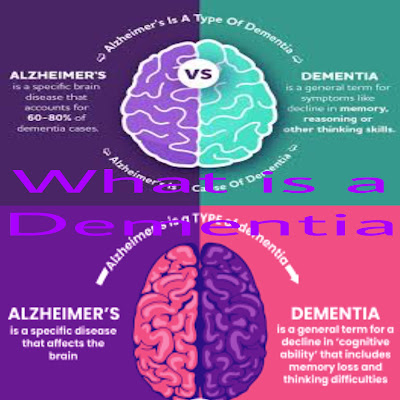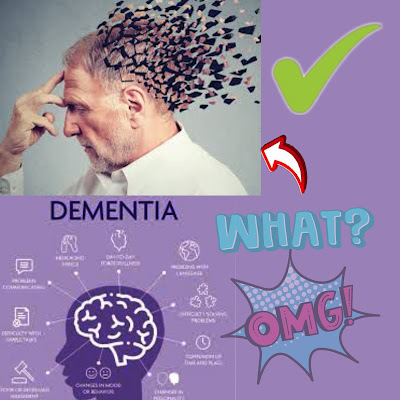Dementia is a syndrome (a group of related symptoms) associated with an ongoing decline of brain functioning. There are many different causes of dementia,Side effects of dementia......
Dementia guide
Dementia isn't a sickness itself. An assortment of side effects result from harm to the cerebrum brought about by various sicknesses, like Alzheimer's. These side effects change as per the piece of the mind that is harmed.
Normal early side effects of dementia
Various sorts of dementia can influence individuals in an unexpected way, and everybody will encounter side effects in their own particular manner.
Nonetheless, there are a few normal early side effects that might show up some time before a finding of dementia. These include:
cognitive decline
trouble concentrating
finding it hard to do natural everyday errands, for example, getting confounded over the right change while shopping attempting to follow a discussion or track down the right word being befuddled finally and place
temperament changes
These side effects are frequently gentle and may deteriorate, without a doubt, bit by bit. It's frequently named "gentle mental debilitation" (MCI) as the side effects are not sufficiently extreme to be analyzed as dementia.
You probably won't see these side effects assuming you have them, and loved ones may not notice or take them genuinely for quite a while. In certain individuals, these side effects will continue as before and not deteriorate. Be that as it may, certain individuals with MCI will proceed to foster dementia.
Dementia is certainly not a characteristic piece of maturing. To this end it's vital to converse with a GP as soon as possible in the event that you're stressed over memory issues or different side effects.
Side effects intended for Alzheimer's infection
The most widely recognized reason for dementia is Alzheimer's infection. Normal side effects of Alzheimer's infection include:
memory issues, for example, consistently failing to remember late occasions, names and faces
posing inquiries drearily
expanding challenges with undertakings and exercises that require association and arranging
becoming confounded in new conditions
trouble tracking down the right words
trouble with numbers as well as taking care of cash in shops
turning out to be more removed or restless
Peruse more about Alzheimer's infection.
Side effects well defined for vascular dementia
Vascular dementia is the second most normal reason for dementia, after Alzheimer's. Certain individuals have both vascular dementia and Alzheimer's sickness, frequently called "blended dementia".
Side effects of vascular dementia are like Alzheimer's illness, despite the fact that cognitive decline may not be as clear in the beginning phases.
Side effects can once in a while grow unexpectedly and immediately deteriorate, yet they can likewise foster continuously over numerous months or years.
Explicit side effects can include:
stroke-like side effects: remembering muscle shortcoming or impermanent loss of motion for one side of the body (these side effects require critical clinical consideration)
development issues - trouble strolling or an adjustment of the manner in which an individual strolls
thinking issues - experiencing issues with consideration, arranging and thinking
mind-set changes - sadness and an inclination to turn out to be more close to home
Peruse more about vascular dementia.
Side effects intended for dementia with Lewy bodies
Dementia with Lewy bodies has a significant number of the side effects of Alzheimer's sickness, and individuals with the condition normally likewise insight:
times of being ready or tired, or fluctuating degrees of disarray
visual mind flights (seeing things that are not there)
turning out to be more slow in their actual developments
rehashed falls and swooning
rest unsettling influences
Peruse more about dementia with Lewy bodies.
Side effects intended for frontotemporal dementia
Despite the fact that Alzheimer's illness is as yet the most well-known sort of dementia in individuals under 65, a higher level of individuals in this age gathering might create frontotemporal dementia than more established individuals. Most cases are analyzed in individuals matured 45-65.
Early side effects of frontotemporal dementia might include:
character changes - decreased aversion to others' sentiments, causing individuals to appear to be cold and barbarous
absence of social mindfulness - making unseemly jokes or showing an absence of consideration, however certain individuals might turn out to be exceptionally removed and unresponsive
language issues - trouble tracking down the right words or grasping them
becoming fanatical - like creating trends for uncommon food sources, gorging and drinking
Peruse more about frontotemporal dementia.
Side effects in the later phases of dementia
As dementia advances, cognitive decline and troubles with correspondence frequently become extreme. In the later stages, the individual is probably going to disregard their own wellbeing, and require consistent consideration and consideration.
The most well-known side effects of cutting edge dementia include:
memory issues - individuals may not perceive close loved ones, or recollect where they live or where they are
correspondence issues - certain individuals may ultimately lose the capacity to talk by and large. Utilizing non-verbal method for correspondence, like looks, contact and signals, can help
versatility issues - many individuals become less ready to move about independent. Some may ultimately become incapable to walk and require a wheelchair or be bound to bed
social issues - a critical number of individuals will foster what are known as "conduct and mental side effects of dementia". These may incorporate expanded tumult, burdensome side effects, nervousness, meandering, hostility, or once in a while pipedreams
bladder incontinence is normal in the later phases of dementia, and certain individuals will likewise encounter gut incontinence
hunger and weight reduction issues are both normal in cutting edge dementia. Many individuals experience difficulty eating or gulping, and this can prompt stifling, chest contaminations and different issues. Alzheimer's Society has a valuable factsheet on eating and drinking.....






0 Comments
Well come to Health net career.